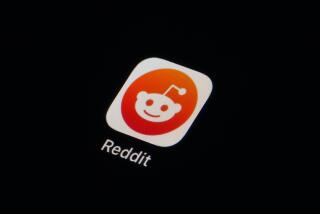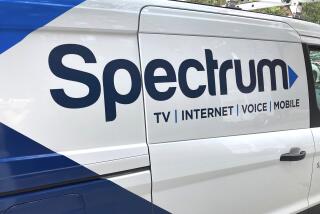NetZero’s IPO Will Test Value of Free Web Access
- Share via
It turns out that free Internet service is pretty expensive after all.
NetZero Inc., the first company to attract a large customer base by promising free Internet access to those who can tolerate targeted advertisements, has lost more than $15 million since four software consultants started the firm in the summer of 1997. Like most Internet start-ups, NetZero expects to continue losing money for the foreseeable future.
Industry analysts are divided on whether the Westlake Village company--and the copycats that followed it--will ever turn a profit. Investors will consider the question as NetZero tries to raise $115 million in an initial public offering, tentatively slated for early September.
“Free ISP service is a fool’s errand on the face of it,” said Greg Tally, associate editor of Boardwatch magazine, a Golden, Colo.-based publication that covers Internet service providers. “I don’t think [the concept] will survive.”
While Tally is hardly alone in his thinking, many others disagree.
“NetZero is strong enough to last,” said Joe Laszlo, an Internet access and bandwidth analyst with media research firm Jupiter Communications Inc. in New York. “For an advertiser-supported model to work, we think it’s vital that a free ISP ramps up quickly in terms of the number of subscribers. The magic number is at about 1 million or so, and NetZero has gotten to that.”
The basic premise behind NetZero’s service is that the Web will become as much of a mass communications medium as television and radio. Audiences don’t have to pay for broadcast TV or radio programs because broadcasters can make money selling ads to companies that want to reach their audiences. Similarly, NetZero plans to recoup the cost of offering Internet access by selling ads that appear every 30 seconds in a 3 1/2-by-1-inch window on its customers’ desktops. NetZero users can move the window around, but they can’t make it go away.
They’re not just any ads. Each NetZero user gets different ads based on his or her personal interests, which the company determines by tracking what sites the user visits on the Web. Customers also must answer about 30 questions about their age, occupation, income and other demographic data when they sign up for NetZero’s service. Then a wealthy customer who expresses an interest in sports could receive ads from a golf equipment maker, for example. In the first half of the year, NetZero received more than $4.5 million in revenue from advertisers such as BellSouth, EBay, Microsoft and Netscape.
When the service debuted in October, privacy advocates wondered whether users would be comfortable sharing so much personal data with a company that was using it for commercial purposes. But so far, NetZero has signed up about 1.2 million registered users in 1,100 U.S. cities, putting it in the same league as heavyweights such as AT&T; WorldNet, EarthLink and MindSpring, which have about 1.6 million, 1.3 million and 1.2 million customers, respectively. Netscape parent America Online is still the dominant player in the industry, with 18 million customers.
About 613,000 NetZero customers used the service in June, and they received more than 830 million advertisements, according to papers the company filed with the Securities and Exchange Commission. That comes out to more than 1,350 ads per customer.
Manish Shah, publisher of IPO Maven in Highlands, N.J., likes those numbers, especially because Web companies are expected to grab as much as 8% of the $150 billion that advertisers spend in the U.S. by the end of 2001, up from about 1% today.
“This is a model that’s here to stay,” said Shah, who thinks the price of NetZero shares could surge in their first day of trading. “The debate is about the size of the profitability, not whether it will be profitable or not.”
But others are less optimistic. Mark Basham, a new-issues analyst for Standard & Poor’s equity research group, points out that many Internet service providers are lowering their prices, making NetZero’s deal comparatively less attractive. Several other companies--most recently CMGI’s AltaVista search engine unit--have followed NetZero’s lead in offering free Internet service to attract audiences that will appeal to advertisers. Even if the business model proves successful, there’s nothing to stop more competitors from following suit, Basham said.
On the flip side, some companies are practically giving away computers to customers who sign long-term contracts with Internet service providers. For instance, customers who sign up for three years of service with Pasadena-based EarthLink can get a free iMac from a Santa Monica start-up called FreeMac.com, while InterSquid.com of Chester, N.J., is shipping free PCs to customers who buy $30-a-month Internet access from the company for 30 months. AOL’s CompuServe, Microsoft Network and Prodigy have offered $400 rebates--almost enough to cover the cost of a bare-bones PC--to customers who agree to use their Internet access services for three years.
There may be room for all the new competitors. Fewer than 40% of U.S. households are connected to the Internet, but that figure is expected to grow substantially in the next few years, Shah said.
Jupiter’s Laszlo said NetZero is likely to survive in the short term. But, he added, “we’ll have to see what happens in the long run.”
NetZero hasn’t specified how many shares it will sell in its IPO or what the offering price will be. Goldman, Sachs & Co.; Donaldson, Lufkin & Jenrette Inc.; Hambrecht & Quist Inc.; and Wit Capital Corp. will underwrite the deal. NetZero shares will trade on Nasdaq under the ticker symbol NZRO.
In other IPO news, this week’s tentative California calendar is empty, but the shaky summer market has been showing surprising strength in the last week. Three California issues posted solid gains in debuts Friday: Agile Software Corp. (ticker symbol: AGIL) of San Jose, which develops Internet content management software; LookSmart Ltd. (LOOK), a San Francisco-based Web directory; and MyPoints.com Inc. (MYPT), a San Francisco-based online direct marketer.
*
Times staff writer Karen Kaplan can be reached at karen.kaplan@latimes.com.







